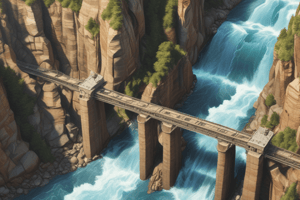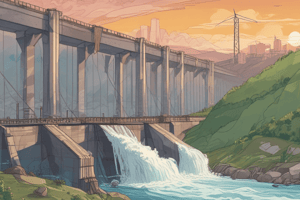Podcast
Questions and Answers
Hydropower plants can supply large amounts of ______ and they are relatively easy to adjust for demand by controlling the flow of water through the turbines.
Hydropower plants can supply large amounts of ______ and they are relatively easy to adjust for demand by controlling the flow of water through the turbines.
electricity
Big dam projects can disrupt ______ ecosystems and surrounding communities, harming wildlife and forcing out residents.
Big dam projects can disrupt ______ ecosystems and surrounding communities, harming wildlife and forcing out residents.
river
The electrical grid is the intricate system designed to provide ______ all the way from its generation to the customers.
The electrical grid is the intricate system designed to provide ______ all the way from its generation to the customers.
electricity
Distribution of ______ first begins with distribution substations that use 'step-down' transformers, which perform the opposite task of the 'step-up' transformer.
Distribution of ______ first begins with distribution substations that use 'step-down' transformers, which perform the opposite task of the 'step-up' transformer.
The aim at restoring more natural ______ and the many benefits they provide to wildlife and people, including recreation.
The aim at restoring more natural ______ and the many benefits they provide to wildlife and people, including recreation.
Electricity exiting the power plant passes through a transmission station where the ______ is 'stepped-up'.
Electricity exiting the power plant passes through a transmission station where the ______ is 'stepped-up'.
Renewable energy, often referred to as ______ energy, comes from natural sources or processes that are constantly replenished.
Renewable energy, often referred to as ______ energy, comes from natural sources or processes that are constantly replenished.
The largest hydropower plant in the world is the ______ on China's Yangtze River.
The largest hydropower plant in the world is the ______ on China's Yangtze River.
A mass of water moving down a ______ difference contains energy which can be harvested using some waterwheel or turbine.
A mass of water moving down a ______ difference contains energy which can be harvested using some waterwheel or turbine.
The Egyptian government has pursued an energy diversification strategy known as the ______ TO 2035.
The Egyptian government has pursued an energy diversification strategy known as the ______ TO 2035.
The ______ of the water causes turbines to turn.
The ______ of the water causes turbines to turn.
The biggest hydropower plant in the United States is at the ______ Dam on the Columbia River in Washington.
The biggest hydropower plant in the United States is at the ______ Dam on the Columbia River in Washington.
A micro hydropower plant has a capacity of up to ______ kilowatts.
A micro hydropower plant has a capacity of up to ______ kilowatts.
A ______ hydropower DOE defines as projects that generate 10 MW or less of power.
A ______ hydropower DOE defines as projects that generate 10 MW or less of power.
The capacity of a hydroelectric power plant depends on the ______ and flow as a result of the hydrology in the catchment area of a river.
The capacity of a hydroelectric power plant depends on the ______ and flow as a result of the hydrology in the catchment area of a river.
The energy source of hydropower is ______, renewed by snow and rainfall.
The energy source of hydropower is ______, renewed by snow and rainfall.
A hydroelectric power system can produce enough electricity for a ______, farm, ranch, or village.
A hydroelectric power system can produce enough electricity for a ______, farm, ranch, or village.
The Forsland hydroelectric station is capable of supplying ______ homes with power.
The Forsland hydroelectric station is capable of supplying ______ homes with power.
Flashcards are hidden until you start studying
Study Notes
- Hydropower plants can supply large amounts of electricity and are relatively easy to adjust for demand by controlling the flow of water through the turbines.
- Big dam projects can disrupt river ecosystems and surrounding communities, harming wildlife and forcing out residents, as seen in the displacement of residents due to the Aswan High dam.
- Decaying organic material in reservoirs releases methane, undermining the promise of carbon-free electricity from hydropower.
- A growing movement aims to tear down dams that are no longer functioning or needed, restoring more natural rivers and their benefits to wildlife and people, including recreation.
- The electrical grid consists of three main sections: electricity generation, transmission, and distribution, with transmission accomplished through power lines and distribution beginning with distribution substations that use "step-down" transformers.
- Renewable energy technologies include solar energy, wind energy, hydropower energy, geo-thermal energy, and biomass.
- Hydropower energy harnesses the kinetic energy of moving water using a turbine connected to a generator, producing electricity.
- The largest hydropower plant in terms of installed capacity is the Three Gorges (Sanxia) on China's Yangtze River, which is 1.4-2.3 km wide and 185 meters high.
- The five largest producers of hydropower are China, Brazil, Canada, the United States, and Russia.
- The Grand Coulee Dam on the Columbia River in Washington is the biggest hydropower plant in the United States, providing about two-thirds of the state's electricity.
- The Egyptian government has pursued an energy diversification strategy known as the Integrated Sustainable Energy Strategy (ISES) to 2035, ensuring the continuous security and stability of the country's energy supply.
- Small hydropower projects generate 10 MW or less of power, while micro hydropower plants have a capacity of up to 100 kilowatts, sufficient for a home, farm, ranch, or village.
- The capacity of a hydroelectric power plant depends on the head (change in level) and flow, resulting from the hydrology in the catchment area of a river.
Studying That Suits You
Use AI to generate personalized quizzes and flashcards to suit your learning preferences.




